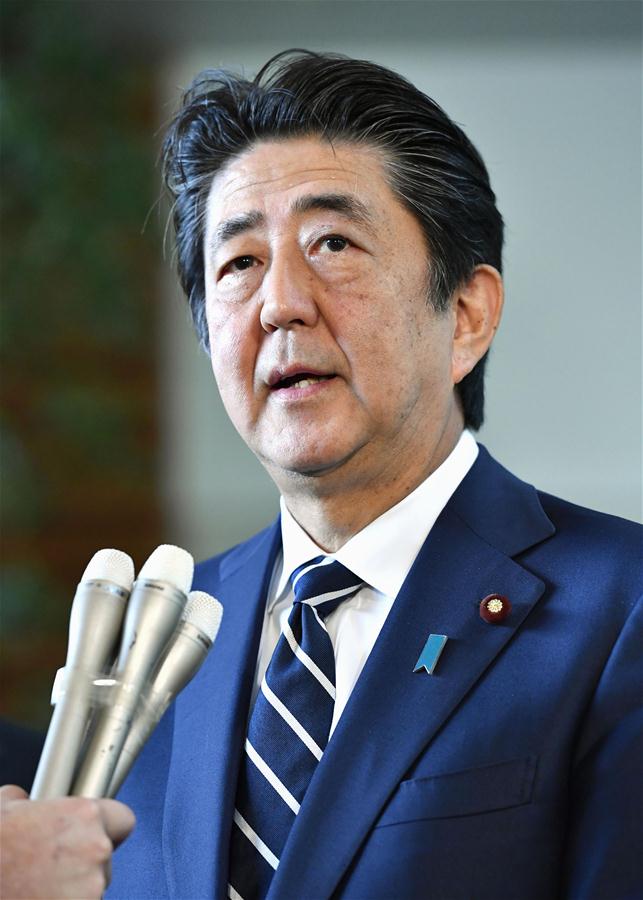
Japanese Prime Minister Shinzo Abe answers questions of media in Tokyo, Japan, Aug. 23, 2019. Japanese Prime Minister Shinzo Abe on Friday urged South Korea to keep its promises after Seoul decided to terminate a key intelligence-sharing pact between the two countries. (Kyodo News via Xinhua)
TOKYO, Aug. 23 (Xinhua) -- Japanese Prime Minister Shinzo Abe on Friday urged South Korea to keep its promises after Seoul decided to terminate a key intelligence-sharing pact between the two countries.
"Regrettably, South Korea is continuing to hurt relations of trust," Abe told reporters, adding that Seoul had also unilaterally carried out actions that run contrary to an accord inked between the two countries in 1965 aimed at settling an ongoing wartime labor dispute.
Separately, Japan's Defense Minister Takeshi Iwaya said on Friday that the decision by South Korea was "disappointing" and that he believed that the present security environment had been "completely misread" by South Korea.
Iwaya added that Japan will continue to ask South Korea to "reconsider" its decision not to extend the General Security of Military Information Agreement (GSOMIA) beyond its expiration in November.
His remarks came after Seoul said a day earlier that the intelligence-sharing pact will not be extended owing to Tokyo's tightening of export controls on materials vital to the South Korean technology industry.
It has created a "grave change" in conditions for bilateral security cooperation, Seoul said, as reported by local media.
Japan's Foreign Ministry confirmed Friday that South Korea has officially notified Tokyo that it will terminate the pact between both countries.
The GSOMIA pact between both sides, signed in 2016, has enabled the two neighbors to share military information and has helped both sides to counter potential regional threats.
The severity of Seoul's decision to scrap the pact, from Tokyo's perspective, was reflected in Japanese Foreign Minister Taro Kono summoning South Korean Ambassador Nam Gwan Pyo to lodge an official protest on Thursday evening.
Abe, in addition, for his part, also told reporters Friday that recent moves by South Korea, including the rulings by South Korean top courts last year ordering Japanese firms to pay compensation to forced laborers during Japan's colonial rule of the Korean Peninsula, had damaged trust between the two countries.
Despite bilateral relations sinking to their lowest level in recent years amid wartime, trade and now military information sharing issues, Abe said Japan had been trying to deal with the situation to maintain relations with South Korea at a functional level "so as not to produce a negative impact on cooperation between Japan, the United States and South Korea in light of the current security situation in Northeast Asia."
"Japan will secure peace and stability in the region by firmly working together with the United States," Abe said, adding that Japan will continue its requests for South Korea to work to restore bilateral trust.
Seoul's decision not to extend the military information sharing pact is the latest move in a tit-for-tat dispute between Tokyo and Seoul that is steadily diminishing ties between both sides.
Japan tightening export controls on key materials imported by South Korea for its semiconductor and display industry following a perceived lack of progress on the wartime labor dispute, and then removing Seoul from a preferential trade list, resulted in Seoul replying with similar trade restrictions and tightening of its on export controls regarding Japan.
The GSOMIA pact, the latest accord to be severed between Tokyo and Seoul, has automatically been renewed annually between both countries since its creation, with the stipulation being if one side is to pull out they are to inform the other in writing, as was the case Friday.
This Saturday would have been the deadline for either side to give written notice of wishing to pull out of the key military intelligence-sharing pact.